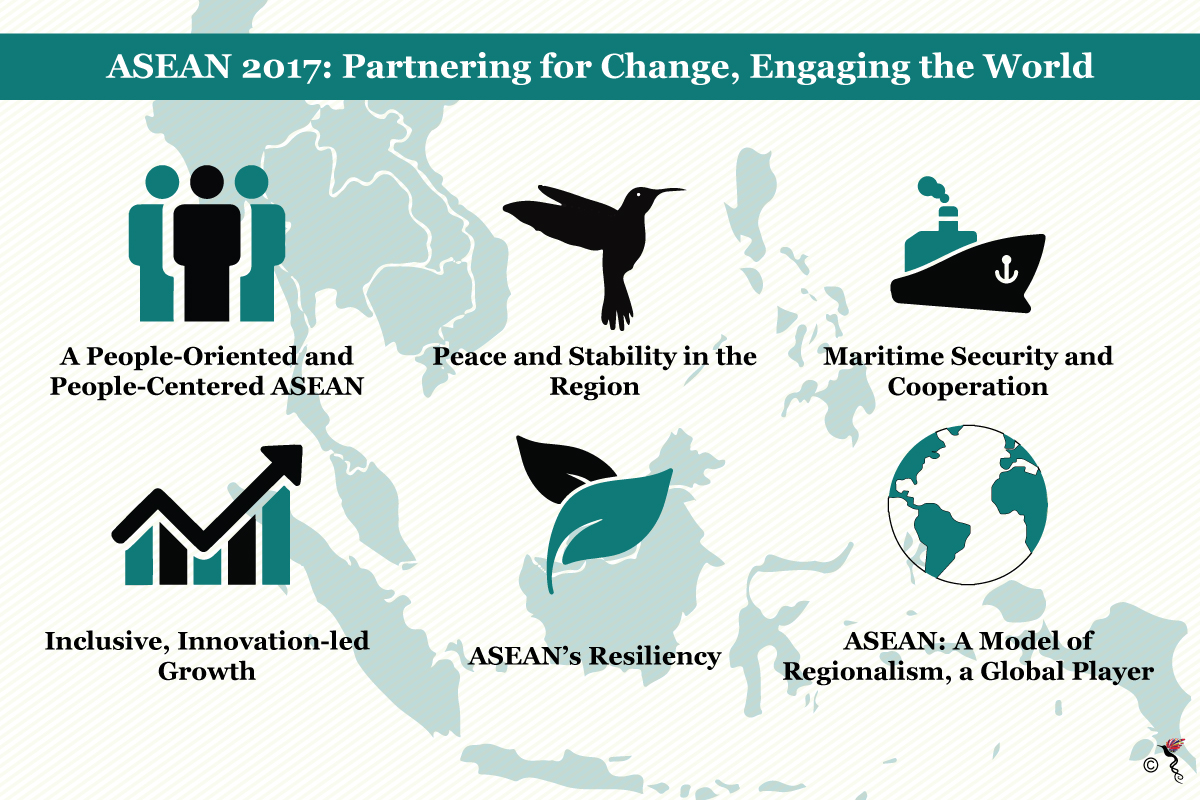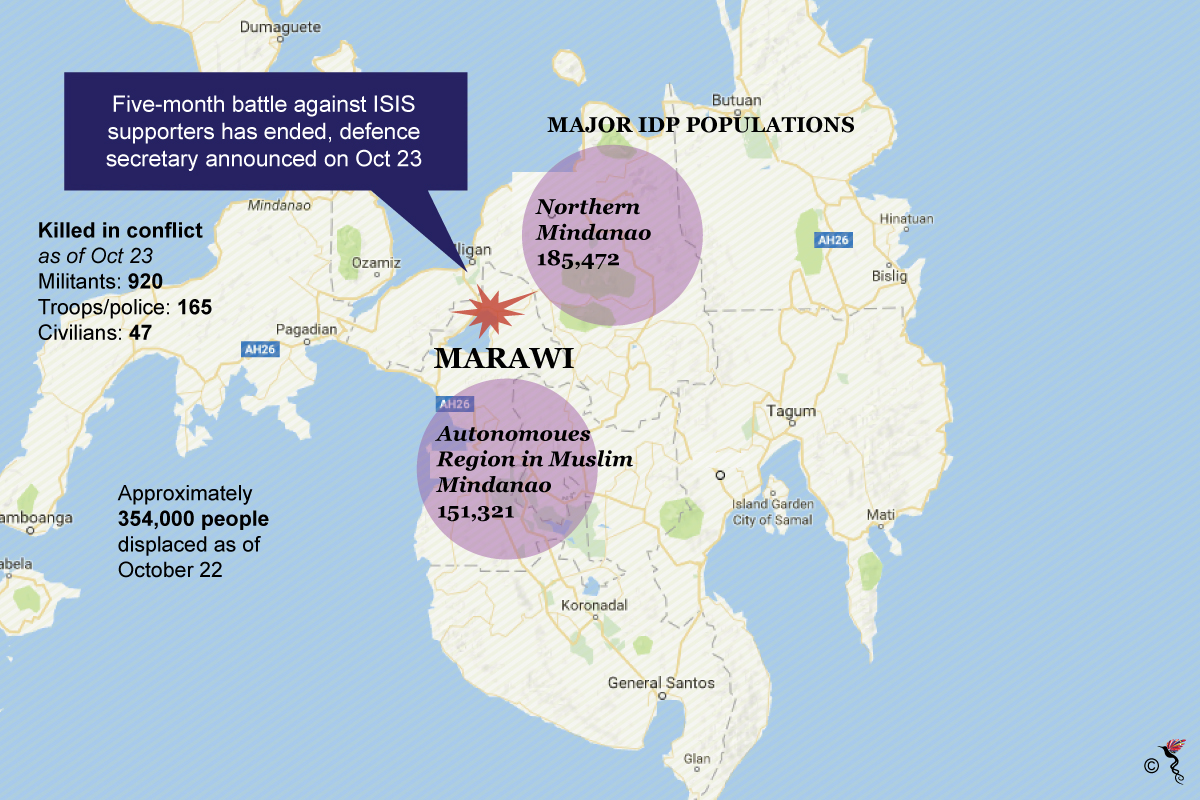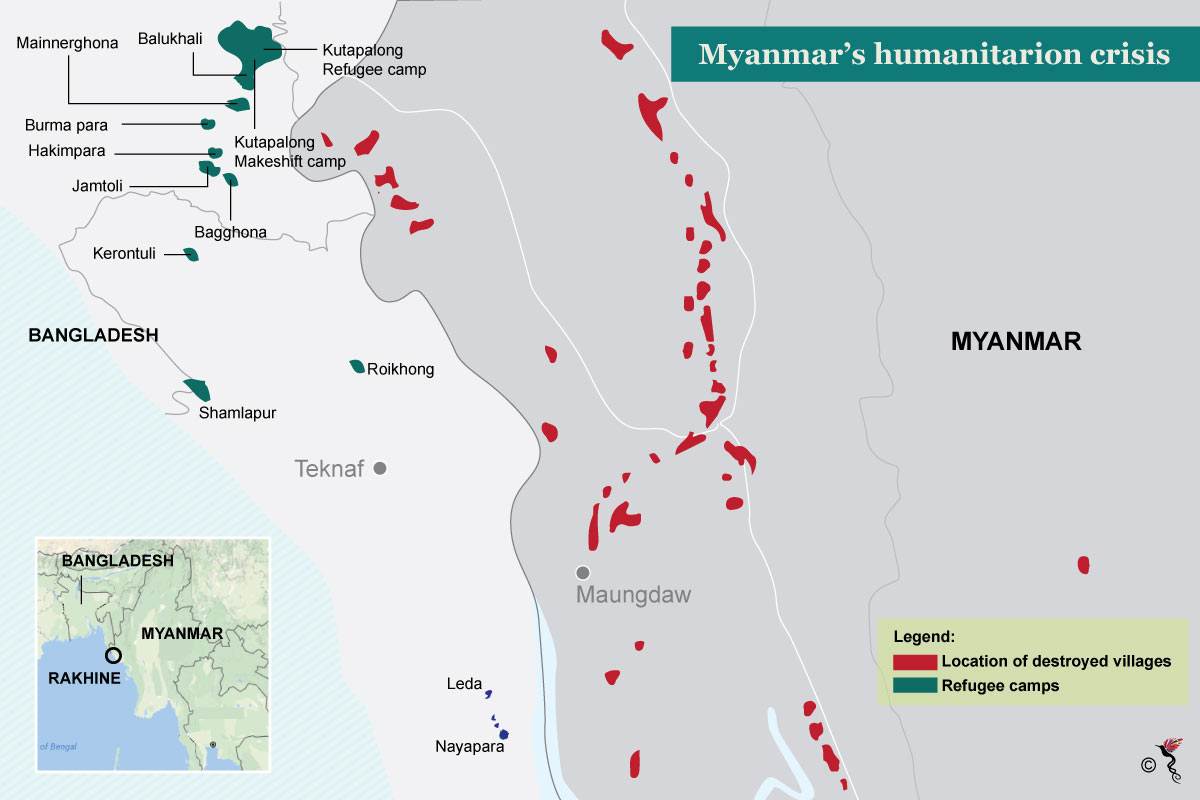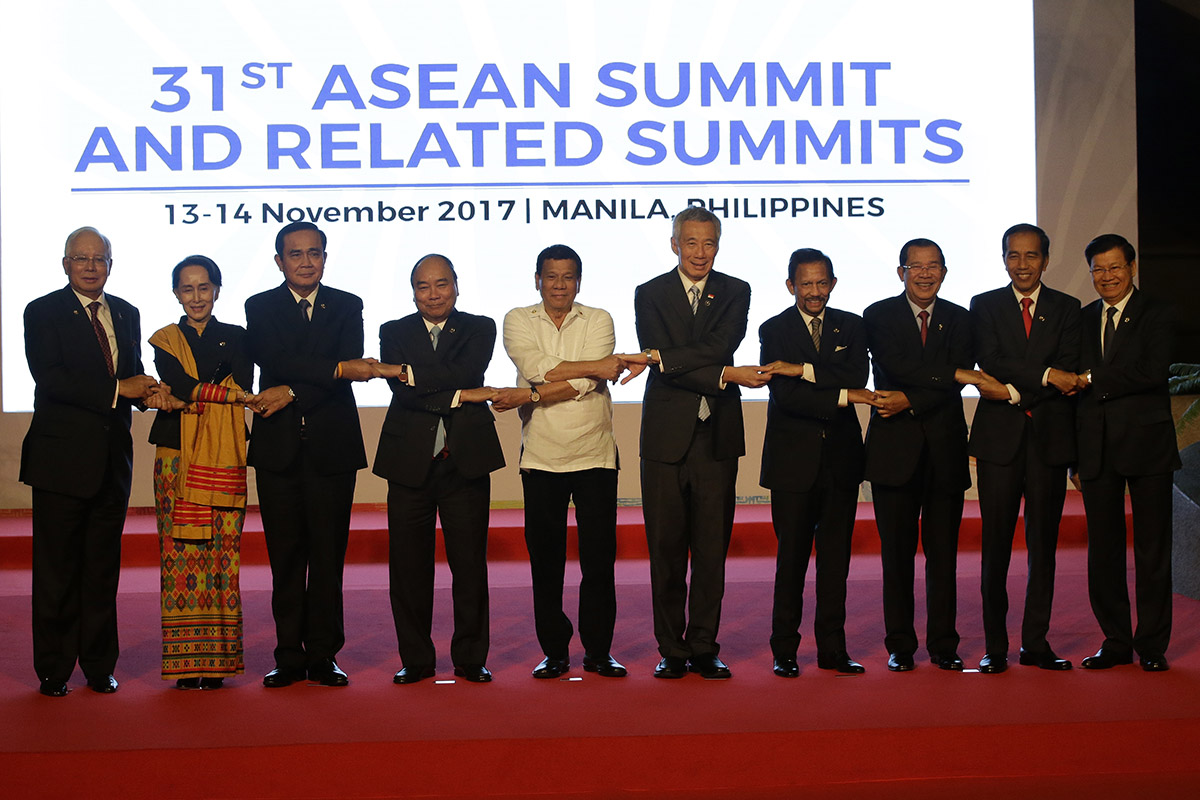The 31st Association of Southeast Asian Nations (ASEAN) Summit and Related Meetings were held in Manila from November 10-14. The summit was held under the theme “Partnering for Change, Engaging the World” – in relation to Philippine government’s aspirations to promote deeper integration amongst ASEAN member states and its partners worldwide.
Philippines’ chairmanship of ASEAN coincided with the 50th anniversary of ASEAN.

ASEAN 2017 thematic priorities.
Successes at the summit
Besides the lighter moments like US President Donald Trump’s confusion with the “ASEAN handshake” and Philippine President and current Chairman of ASEAN, Rodrigo Duterte serenading Trump with a love song, there were many issues which were discussed and tackled throughout the four days. The focus of this year was vast, including maritime disputes, matters of trade, cybercrime and terrorism, among others.
A key achievement in the summit this year was with regards to the South China Sea dispute. Duterte, in a press conference announced that China had agreed to be bound to a code of conduct to ensure peaceful resolution of the dispute. The discussions on a binding code of conduct will follow-up on a previous similar code, agreed upon in 2002 which was not legally binding.
His words were echoed by Chinese Premier, Li Keqiang who expressed his hope for peace and stability in the South China Sea to leaders in Manila.
“We hope the talks on the code of conduct will bolster mutual understanding and trust,” Li said.
ASEAN leaders and China also agreed to a 10-year pact for coastal and marine environmental protection from 2017 to 2027.
Besides that, the issue of terrorism also took centre stage – especially more since the Philippines is still recovering from the horrors of a five-month long battle with insurgents in Marawi, located on the island of Mindanao in the Philippines. According to Duterte, the issue dominated high-level meetings during the summit and even in his bilateral exchanges with foreign heads. On Tuesday, the "Manila Declaration To Counter The Rise of Radicalization and Violent Extremism" was released which highlighted initiatives to effectively stem terrorism in the region.

Marawi insurgency in the Philippines (Source: AFP)
Furthermore, ASEAN reaffirmed its commitment to free trade by inking a free trade agreement and bilateral investment pact with Hong Kong. Amid Trump’s protectionist undertone at last week’s Asia Pacific Economic Cooperation (APEC) Summit, ASEAN seemed undeterred and looks to push forward with a free trade agenda.
The inaugural Regional Comprehensive Economic Partnership (RCEP) summit was also held on Tuesday.
According to Philippine Department of Trade and Industry Undersecretary Ceferino Rodolfo, “the level of engagement of the RCEP has been unprecedented.”
Another major achievement was the signing of the “ASEAN Consensus on the Protection and Promotion of the Rights of Migrant Workers.” The consensus includes provisions for fair treatment of workers, visitation rights by family members and protection against sexual violence and harassment at the work place. The road to the signing of this consensus took more than 10 years as states differed in opinion on whether the document should be legally-binding or not. It is now up to ASEAN member states to formulate an action plan to implement the provisions of the consensus.
ASEAN’s deep scented wounds
Amid the brouhaha of ASEAN’s achievements at the summit, the elephant in the room needs to be addressed – the humanitarian crisis in Myanmar’s Rakhine State.
Violence and allegations of arson, rape and murder committed by Myanmar’s military have been dominating headlines worldwide. Yet, the issue was barely addressed in Manila. Duterte’s chairman statement merely mentioned the crisis as a “a matter of disaster resiliency.”
So far, more than 600,000 ethnic Rakhine Muslims, also known as Rohingyas have fled Myanmar to nearby Bangladesh and their numbers continue to rise. Their plight is no better as they find themselves huddled in overcrowded refugee camps along the Myanmar-Bangladesh border, lacking food, clean drinking water and proper sanitation.
Reflecting on this, Joshua Kurlantzick, Senior Fellow for Southeast Asia at the US based Council for Foreign Relations, expressed his disappointment in ASEAN’s inaction in addressing this still-unfolding humanitarian crisis.
“I understand ASEAN operates by consensus, and Suu Kyi was at the summit, and many other ASEAN leaders are autocrats who are uninterested in having anyone poke into their own internal situation regarding human rights. But to mostly ignore such a major humanitarian crisis makes one wonder what the point of ASEAN is,” he said in an email interview with The ASEAN Post.

Location of refugee camps in Bangladesh
Duterte himself has been facing criticism for his handling of the drug crisis in the Philippines. Extrajudicial killings have been part of Duterte’s tactic towards combatting the increase in drug related cases but since the killings of several teenagers in August and September, Duterte’s policy has been under severe scrutiny. The police are now denying that they ever executed individuals suspected of drug related offences although the evidence begs to differ.
When the issue was raised by Canadian Prime Minister, Justin Trudeau, Duterte responded that he was insulted – although he never mentioned Trudeau’s name specifically.
“I said I will not explain. It is a personal and official insult,” he said, adding that he wanted the media, especially the foreign media to “lay off” the issue.
Trudeau’s actions were highly praised by some quarters after the issue of human rights violations was not brought up by Trump when he met with Duterte. Although the White House released a statement saying the matter was “briefly” tackled, Trump never addressed the issue out in the open like Trudeau did.
Moving forward: ASEAN’s future agenda
At the conclusion of the summit, Duterte passed the gavel to Singaporean Prime Minister, Lee Hsien Loong, signifying the transference of ASEAN’s chairmanship to the island nation. Singapore’s chairmanship of ASEAN next year will place heavy emphasis on the digital economy and e-commerce, besides also ensuring ASEAN remains relevant in the international fora.
“We live in a rapidly changing world, to keep ASEAN a central and dynamic driving force that can deal with the challenges and opportunities, Singapore’s chairmanship focuses on the themes of resilience and innovation,” Lee said as the ASEAN Summit drew to a close.
In his remarks, Lee also welcomed the incoming ASEAN Secretary General, Bruneian diplomat, Lim Jock Hoi.
ASEAN leaders are likely to still be revelling in the “graduation goggles” of the recently concluded summit. But they have a lot on their plate to work on now. ASEAN isn’t perfect, and will continue to face harsh criticism for its actions or inaction. If the summit represents a commitment made together to handle an issue, now is the time to showcase the depth of such commitment by ensuring proper implementation.
Recommended stories:
